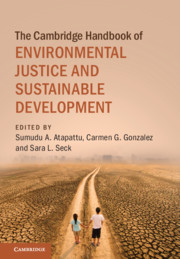Book contents
- The Cambridge Handbook of Environmental Justice and Sustainable Development
- The Cambridge Handbook of Environmental Justice and Sustainable Development
- Copyright page
- Contents
- Contributors
- Acknowledgments
- Foreword (on Living in an Interregnum)
- 1 Intersections of Environmental Justice and Sustainable Development
- Part I Frameworks
- Part II Case Studies
- Strategies, Challenges, and Vulnerable Groups
- Toxic Substances and Hazardous Wastes
- Resource Extraction
- 19 The Vedanta (Niyamgiri) Case
- 20 Demarginalizing the Intersection of Ecological and Social Disadvantage in South Africa
- 21 Sustainable Mining, Environmental Justice, and the Human Rights of Women and Girls
- Energy
- Climate Change
- Part III Conclusion
- Index
20 - Demarginalizing the Intersection of Ecological and Social Disadvantage in South Africa
A Critique of Current Approaches to Dealing with Historical Injustice – the Tudor Shaft Case Study
from Resource Extraction
Published online by Cambridge University Press: 26 March 2021
- The Cambridge Handbook of Environmental Justice and Sustainable Development
- The Cambridge Handbook of Environmental Justice and Sustainable Development
- Copyright page
- Contents
- Contributors
- Acknowledgments
- Foreword (on Living in an Interregnum)
- 1 Intersections of Environmental Justice and Sustainable Development
- Part I Frameworks
- Part II Case Studies
- Strategies, Challenges, and Vulnerable Groups
- Toxic Substances and Hazardous Wastes
- Resource Extraction
- 19 The Vedanta (Niyamgiri) Case
- 20 Demarginalizing the Intersection of Ecological and Social Disadvantage in South Africa
- 21 Sustainable Mining, Environmental Justice, and the Human Rights of Women and Girls
- Energy
- Climate Change
- Part III Conclusion
- Index
Summary
South Africa’s commercial capital, Johannesburg, owes its existence to the discovery of a gold-bearing reef on a farm in the Witwatersrand basin in 1886. Over time, gold-mining on the Witwatersrand reef developed to sustain a “minerals–energy complex” that formed the basis of apartheid’s racialized capital accumulation model.2 While many of the major gold-mining houses have long-since decamped due to the depletion of gold reserves and declining profitability of these mines since the early 1990s, the landscape is still emblematically littered with numerous gold-colored mine dumps, or tailings dams, which provide a very visible reminder of the history of gold-mining in the area.3
- Type
- Chapter
- Information
- Publisher: Cambridge University PressPrint publication year: 2021



